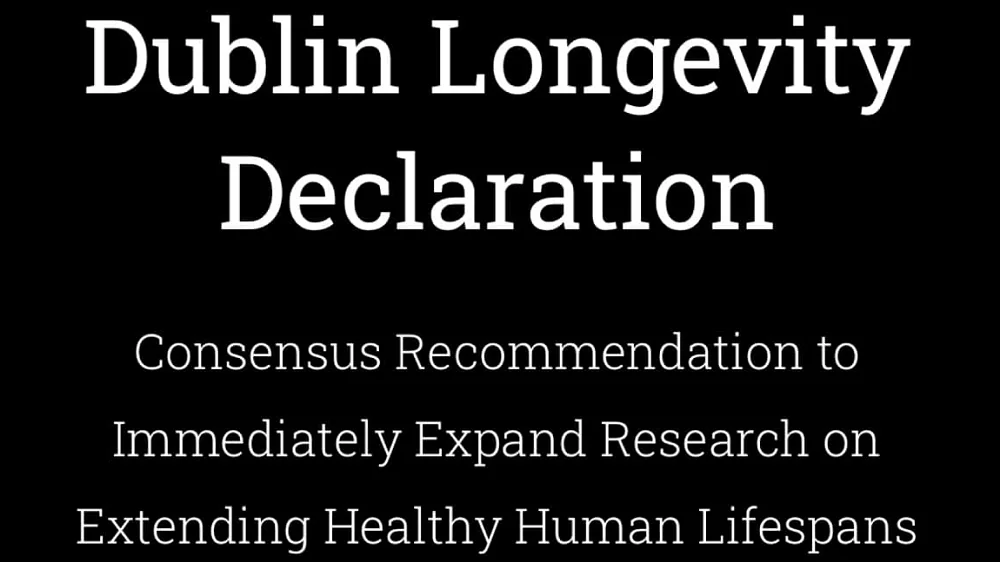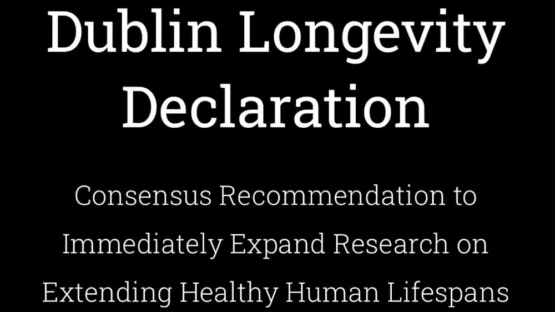The Dublin Longevity Declaration, an unprecedented initiative that aims to change humanity’s perception of aging, is scooping signatures at a record pace.
The need for a paradigm shift
Last August, hundreds of longevity enthusiasts, from certified geroscience stars to graduate students, gathered in Dublin for the annual Longevity Summit conference. As the attendants were enjoying the talks, far from the spotlight, a first-of-a-kind document was taking shape: the Dublin Longevity Declaration. Now, the Declaration is out, and it has been an immediate success, garnering more than a thousand signatures in just two days.
The effort was spearheaded by Dr. Aubrey de Grey, head of the Longevity Escape Velocity Foundation (LEVF), Prof. Brian Kennedy of the National University of Singapore, and Martin O’Dea, CEO of Longevity Summit Dublin. The Declaration, subtitled “Consensus Recommendation to Immediately Expand Research on Extending Healthy Human Lifespans”, asserts the urgent need for a paradigm shift in how humanity views aging.
Both healthspan and lifespan
According to the Declaration, “for millennia, the consensus of the general public has been that aging is inevitable”, but recent advances in geroscience call for a major reassessment.
Deeply rooted misconceptions about life extension, it continues, slow down the acceptance of the idea that aging can be targeted. For instance, many people mistakenly think that only the last part of life, which is accompanied by frailty and diseases, can be extended. This led the longevity community to embrace “healthspan” as a goal. In reality, however, lifespan and healthspan are closely linked.
Yet, the relationship between them is not linear, and many potential therapies, such as small molecules, “might only extend average healthspan by five or ten years and may not extend maximum lifespan at all.” This would still amount to a revolution in medical practice, explains the Declaration, saving trillions per year in medical costs and drastically improving life quality, but the possibilities are much greater than that.
Great expectations
We need to boldly and persistently tackle the fundamental questions, such as “What biological processes cause aging?” “Can aging be reversed, or just significantly slowed?” “How would extending lifespan change humans and human society?”
Answering those questions is a monumental task in terms of time and resources, but it would “undoubtedly pay for itself many times over”, the Declaration claims. However, it is more than just numbers and calculations. Embarking on this journey would align with humans’ fundamental itch to acquire “knowledge for knowledge’s sake”.
The Declaration then offers a glimpse into a world where aging has been put under control. In this world, “the energy of youth [would be] combined with the wisdom of experience” and people would live long enough for space travel, be able to start a new career at 80, and so on.
Countering aging would be a multi-disciplinary effort, facilitated by the ever-growing amount of health data and the power or AI. Importantly, ideas that today might seem far-fetched should be seriously explored, and “there needs to be an acceptance and tolerance of significantly higher levels of failure in longevity research, knowing that big ideas are sometimes wrong and that the ones that are right will far outweigh the setbacks.”
The Declaration then recounts some of the emerging anti-aging strategies, including combinatorial approaches, cellular reprogramming, and gene therapies. It ends with the question that until recently would have been seen by most scientists as outlandish: “Is radical life extension foreseeable?” The answer, according to the Declaration, is not negative. Rather, we would have to figure it out by mobilizing humanity’s vast material and creative resources.
Why now?
Judging by the reaction of the longevity community, such a document was long overdue. Numerous researchers promoted the Declaration on social media, including Harvard professor David Sinclair, who said to Lifespan.io that the Declaration “represents a call to arms for scientists, entrepreneurs and governments to rally against the leading cause of disease and suffering on the planet: aging. If the goals in this document are realized, and we develop medicines to slow and even reverse the aging process, the healthy lifespan of billions of people will be longer, happier and more productive, saving the US trillions of dollars in healthcare costs over the coming decades.”
Asked about the meaning and importance of the Declaration, de Grey said to Lifespan.io that it was his long-time goal to bring the longevity community to make a joint statement about aging “not being a completely immutable thing that’s woven into the fabric of the universe.”
“We’ve gone far enough in the laboratory and in the clinic,” he continued, “that it now becomes possible, even for people who were not willing to say anything before, to come out and be at least willing to sign up to something quite optimistic.” De Grey credited Brian Kennedy and Martin O’Dea with crafting a wording that enough scientists felt comfortable to support.
While the Declaration does not mention more radical concepts, such as lifespan escape velocity, according to de Grey, it still contains “quite a lot of things that only a small minority of the mainstream community would have been willing to talk about before.”
A basis for action
Asked why the Declaration lacks a clear call to action, de Grey explained that this was intentional: the main goal of the document is to assert the possibility of controlling aging, “providing reinforcement to future calls to action, where people can say: listen, many very credential experts say it’s not science fiction.”
Still, de Grey plans to actively engage policymakers, mainstream media, celebrities, and prominent scientists from other fields. “As things build up,” he said, “we’re going to get more and more attention, and that will take things to another level. We’re working on that.”
De Grey is not angry or frustrated about not being able to move the needle for two decades, because he is aware of how deeply the idea of the inevitability of aging is rooted in the human psyche: “I’ve always taken the view that this irrationality is not something I can blame anybody for, because it arises from millennia of inability to do anything about aging.”




